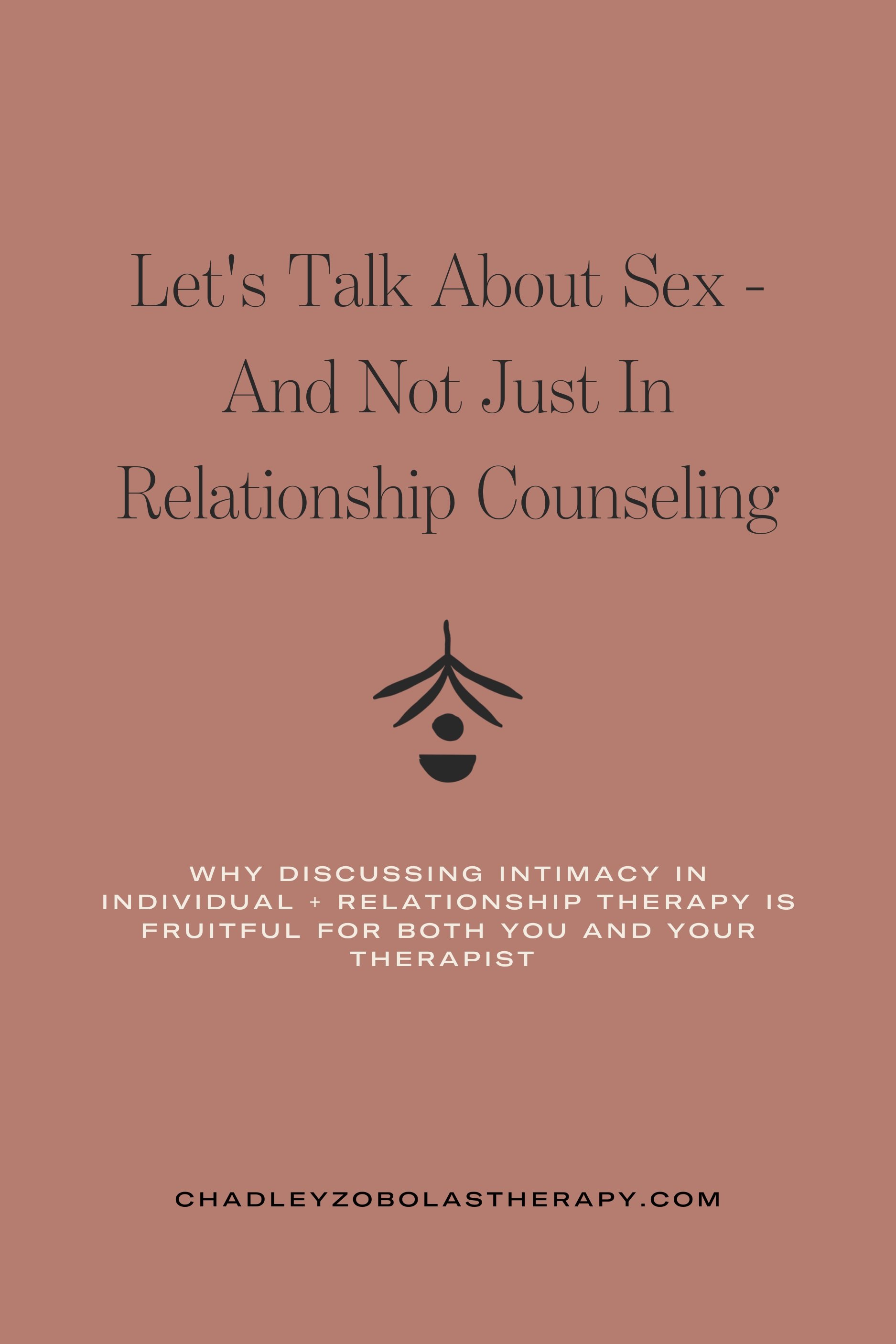Let’s Talk About Sex - And Not Just in Relationship Counseling
Why Discussing Intimacy in Individual and Couples Counseling is Fruitful for Both You and Your Therapist
Many enter therapy with the hope that global well-being will improve. Better communication, increased intentionality towards one’s relationship with their body, self-compassion, reduced stress, and insight are all commonly stated goals for therapy that account for physical, emotional, and mental health. Why is it then that a pillar of life itself- and often times a source of pain, confusion, neglect, and trauma- is not assessed for or discussed by clients and their therapists? I’m referring to sex, and here to advocate for its normalization within the therapy room.
Undoing the Taboo: Why is Talking about Sex Therapeutically Relevant?
Provides insight about attachment patterns
“Attachment” within a therapy context describes how we seek closeness or distance with people presently in our lives based on how our caregivers responded to our needs as children. Read our blog on Attachment Styles to learn more. What sexual partners we attract, who we are attracted to, and what sex fulfills for us may provide insight about our relationships with formative individuals in our lives and how we use our bodies in addition to our words to convey desire, experience, and needs.
Reveals how trauma may reside in our body
Trauma of all kinds- including sexual trauma as well as conditions such as grief- often manifests as physical symptoms like fatigue, pain, discomfort, and tension. Communicating with your therapist about how sexual engagement exacerbates, catalyzes, relieves, or interacts with physical symptoms can offer avenues for addressing trauma physiologically and emotionally, as well as set parameters for non-triggering sexual activity.
Integrates with our relationship to our body image and self-esteem
What is your relationship like with your body? Do partners’ body types mirror your own? Does sex function to increase, neutralize, or decease your self-esteem? Exploring the intersection between intimacy, body image, and our self-perception – even if the connections do not seem immediately obvious - creates roadmaps for curiosity about what sex satisfies on an emotional and physical level.
Increases connectivity through validation
Sexual insecurity or dysfunction can be an isolating experience and makes us wonder, am I doing something wrong? Am I the only one experiencing this? Did I do something to cause this? Receiving normalization from your therapist about the existence of these concerns among others and their prevalence can undo aloneness and shame.
Is it Only OK to Talk About in Couples Therapy?
Sex is a component of individual and relational functioning. Whether we have a partner/partners or not, sex is a part of our lived experiences, including our philosophies on morality, family building, play, connection, and danger. Discussion about how sex operates in your life with a therapist does not necessitate another person.
OK, So How and When Do I Talk About It?
Ideally, your therapist should ask about things pertaining to sex such as sexual orientation, preferences, and safety concerns during the intake and routinely throughout the course of treatment. However, even if your therapist does not initiate conversations about sex, it is entirely within your right to broach exploration of these topics as it pertains to your presenting concern at any point in the process.
What To Do Next if You’re Seeking Sex-Positive Couples Counseling.
Start with an initial consultation with a therapist whose values seem to align with yours. If you’re seeking couples counseling in Denver, connect with a couples therapist at CZ Therapy Group for a free consultation. We’d love to help you explore experiences pertaining to sexual functioning, identity, and more in a trauma-informed, non-shaming environment.
About the Writer
Jordan Kurtz (she/her) is a trauma and relationship therapist at CZTG who focuses on therapy for grief, trauma, adolescence, and couples. Jordan is authentic, warm, and affirming of her clients’ identities and experiences.
Interested in exploring what it would be like to start therapy and resonate with Jordan’s approach? Reach out for a free consult with Jordan to learn more about her work as a trauma therapist and relationship counselor in Denver, Colorado.



